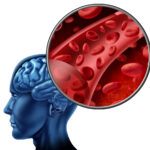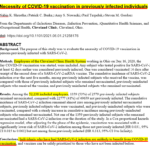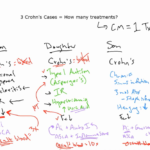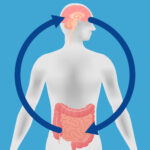If a child suddenly develops behavioral and neurological symptoms after a strep infection, PANDAS should be suspected. PANDAS is a neuro-immune disorder in which a strep infection triggers brain inflammation and the immune system starts to attack and destroy brain tissue, causing a sudden onset of neurological symptoms.
PANDAS stands for Pediatric Autoimmune Neuropsychiatric Disorders Associated with Streptococcal Infections.
PANS, or Pediatric Acute-Onset Neuropsychiatric Syndrome, is similar, except environmental factors or other infections trigger symptoms.
PANDAS diagnosis criteria
- Significant obsessions, compulsions, tics
- Abrupt onset of symptoms or relapsing and remitting symptom severity
- Onset prior to puberty
- Association with strep infection
- Association with neuropsychiatric symptoms, including PANS symptoms
PANS diagnosis criteria:
Abrupt, dramatic onset of OCD or severely limited food intake and the addition of at least two of the following:
- Anxiety
- Emotional swings and/or depression
- Irritability, anger, oppositional behavior
- Regression
- School performance deteriorates
- Sensory or motor abnormalities
- Sleep disturbances, urinary frequency, bed wetting
Functional neurology help for PANDAS/PANS
Because PANDAS and PANS involve the immune system, management involves testing markers for inflammation, infections, immune function, and brain autoimmunity (when the immune system attacks and destroys brain tissue).
It’s also helpful to conduct a functional neurology exam to identify compromised areas of the brain, as well as to establish a baseline of brain function.
Repeat testing can show you how well PANDAS/PANS protocols are working. Functional neurology rehabilitation may also help with recovery. For instance, therapies targeting different areas of the brain can calm an over active immune system and over activation of pathways.
Functional medicine help for PANDAS/PANS
Additionally, functional medicine strategies may include removing inflammatory triggers from the diet and the environment; nutritional therapies to lower inflammation and support brain health; addressing blood sugar, gut health, and toxicity; supporting neurotransmitters; and repairing mitochondrial function and the blood-brain barrier.
Conventional medical help for PANDAS/PANS
Therapies from the conventional model that have been shown to help include steroids and NSAIDs for inflammation; plasmapharesis (plasma exchange) to reduce antibodies; intravenous immunoglobulins (IVIG) to support immune modulation; and immune modulating medications when necessary.
Understanding the PANDAS/PANS brain
When PANDAS/PANS strikes a child — an estimated 1 in 200 children are affected — parents become both frightened and devastated. Understanding what is happening in the brain can help alleviate anxiety.
The functional neurology exam can help identify which pathways in the brain are affected. PANDAS/PANS typically affects communication loops between the basal ganglia, cerebellum, and frontal lobe.
Act quickly to address PANDAS/PANS
PANDAS/PANS is a significant and scary disorder, but taking action quickly improves the chances of an optimal outcome. For more information, contact my office.







